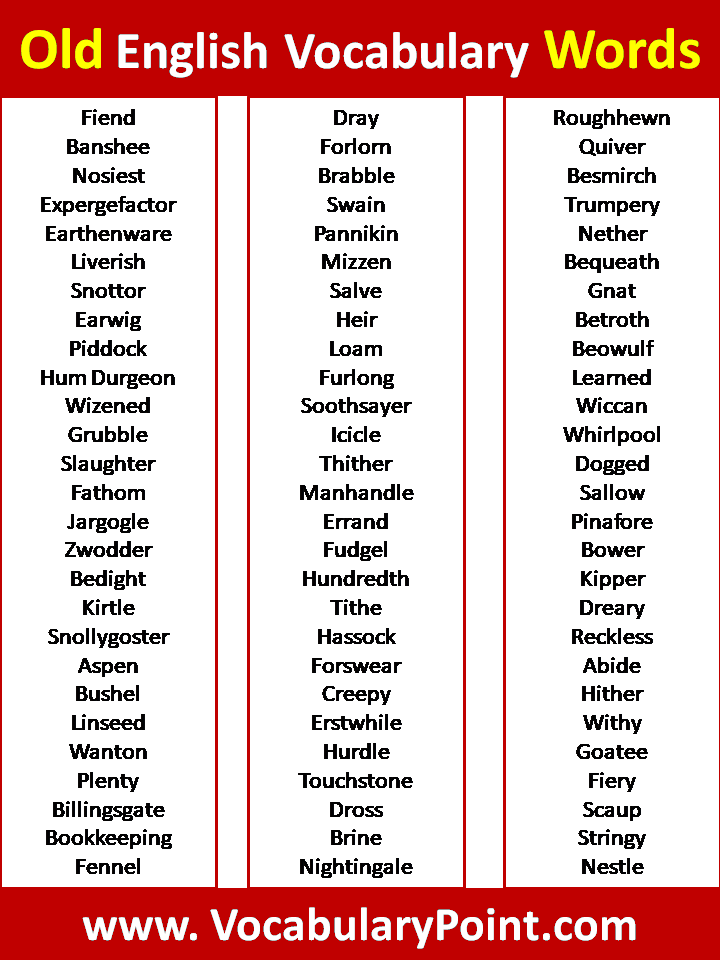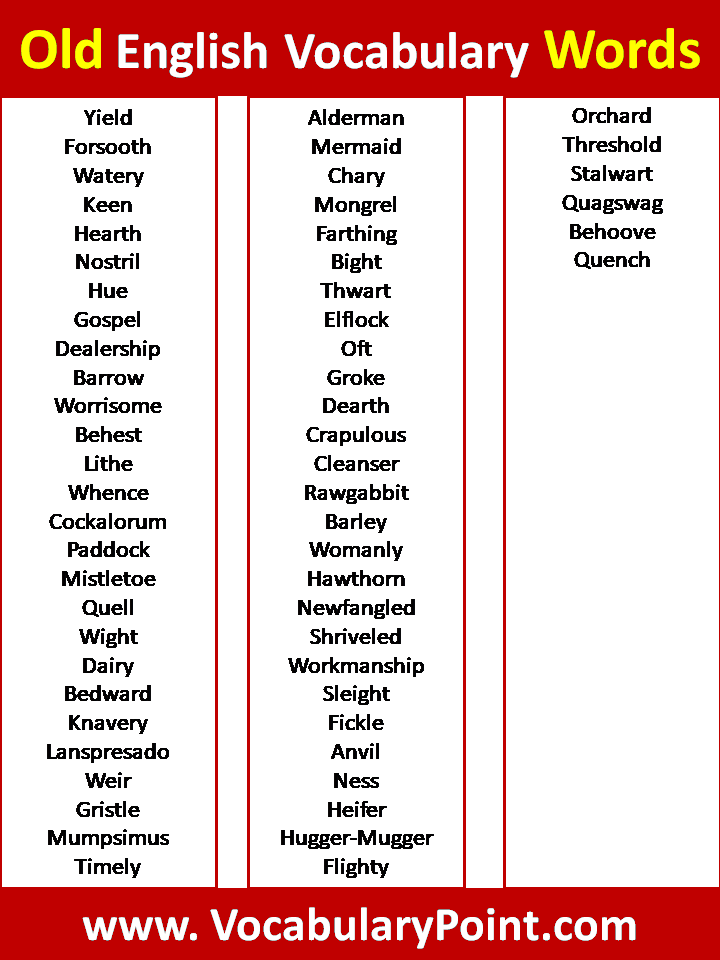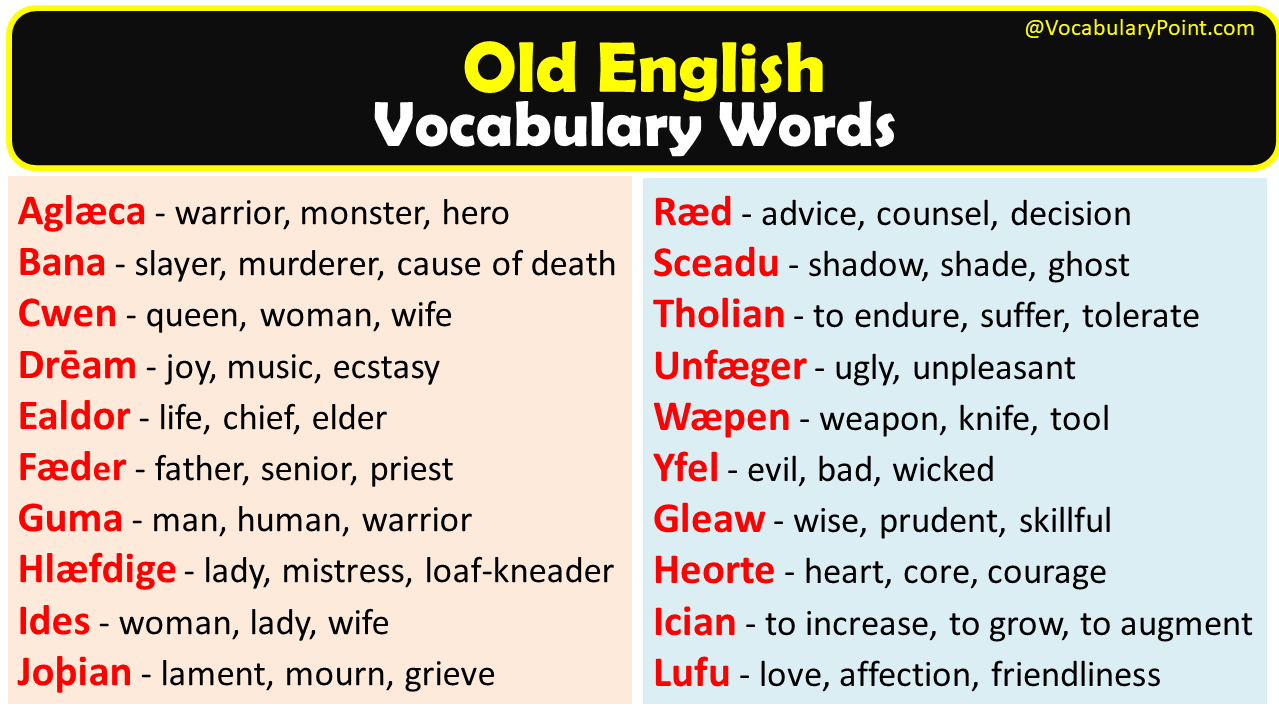Old English Vocabulary words, the precursor to the modern English we use today, offers a fascinating glimpse into the linguistic roots of our contemporary language. This article delves into the rich tapestry of Old English words, many of which have fallen out of common usage but still resonate with historical and linguistic significance.
As we explore these ancient terms, we’ll uncover their meanings, origins, and the reasons they were pivotal in the development of English. Whether you’re a linguist, a history enthusiast, or simply curious about the evolution of language, understanding these archaic words provides not only a window into the past but also a deeper appreciation for the complexity and beauty of English.
Old English Words
- Aglæca – warrior, monster, hero
- Bana – slayer, murderer, cause of death
- Cwen – queen, woman, wife
- Drēam – joy, music, ecstasy
- Ealdor – life, chief, elder
- Fæder – father, senior, priest
- Guma – man, human, warrior
- Hlæfdige – lady, mistress, loaf-kneader
- Ides – woman, lady, wife
- Joþian – lament, mourn, grieve
- Kith – native land, home, people
- Lēoþ – poem, song, ode
- Morgen – morning, morrow, sunrise
- Nīwe – new, fresh, novel
- Ofermod – arrogance, pride, bravery
- Plega – play, sport, fight
- Ofermod – arrogance, pride, excessive courage
- Plega – play, sport, game
- Quellen – to kill, to die, to extinguish
- Ræd – advice, counsel, decision
- Sceadu – shadow, shade, ghost
- Tholian – to endure, suffer, tolerate
- Unfæger – ugly, unpleasant, inappropriate
- Wæpen – weapon, knife, tool
- Yfel – evil, bad, wicked
- Gleaw – wise, prudent, skillful
- Heorte – heart, core, courage
- Ician – to increase, to grow, to augment
- Lufu – love, affection, friendliness
- Morgenstefn – morning voice, early bird
- Næfre – never, not ever, at no time
- Orra – point, beginning, spur
- Pledge – guarantee, promise, security
- Rune – secret, mystery, letter
- Sweotol – clear, evident, manifest
- Thrymm – strength, force, power
- Uhtcearu – pre-dawn anxiety, morning sorrow
- Wic – dwelling, village, camp
- Ymbren – revolution, cycle, course
- Geste – guest, visitor, stranger
- Harrow – shrine, temple, holy place
- Irminsul – great pillar, universal
- Leas – false, devoid, without
- Mickle – great, large, much
- Nan – none, not one, neither
- Orlege – war, battle, combat
- Pund – pound, weight, currency
- Quist – branch, twig, bough
- Reaf – spoil, plunder, clothing
- Scop – poet, shaper, creator
- Tid – time, hour, occasion
- Ungelic – unlike, dissimilar, different
- Weorc – work, labor, deed
- Yfel – evil, disaster, misfortune
- Gleowine – musician, minstrel
- Holm – island, rising land, water
- Inwit – deceit, guile, malice
- Lar – teaching, lesson, doctrine
- Mearc – mark, boundary, border
- Nyd – need, necessity, compulsion
- Oft – often, frequently, repeatedly
- Pith – essence, core, strength
- Quoth – said, spoke, declared
- Rood – cross, crucifix, pole
- Swith – strong, severe, swift
- Thrall – slave, servant, bondage
- Ure – our, ours, us
- Wan – lacking, deficient, pale
- Ymb – around, about, concerning
- Glisnian – to glisten, shine, sparkle
- Hæthen – heathen, pagan, non-Christian
- Indryhten – noble, distinguished, excellent
- Lufian – to love, cherish, care for
- Mægen – strength, power, force
- Nænig – none, no one, not any
- Oswald – divine power, god-rule
- Pegn – thane, warrior, retainer
- Quench – extinguish, suppress, satisfy
- Ran – robbery, plunder, seizure
- Snotor – wise, clever, skilled
- Torn – anger, grief, trouble
- Utan – from outside, externally
- Weg – way, road, path
- Yare – ready, prepared, prompt
- Grim – fierce, savage, stern
- Hlanc – lank, slender, lean
- Icicle – ice, frozen, spike
- Læce – leech, physician, healer
- Mete – food, meal, meat
- Niwian – renew, restore, refresh
- Ofost – haste, urgency, speed
- Pæþ – path, track, way
- Quat – squatted, crouched, settled
- Reord – speech, voice, language
- Scearp – sharp, acute, keen
- Thorn – thorn, spike, pain
- Ure – hour, time, season
- Welkin – sky, heaven, firmament
- Yern – eagerly, quickly, earnestly
- Gist – guest, stranger, spirit
- Hleapan – leap, jump, run
Explore More Vocab:
Modern English words| Dawn Vocabulary| Words with Y
List of Old English Vocabulary Words
- Acweccan – to awaken, stir
- Beorht – bright, clear
- Cyning – king, ruler
- Deorc – dark, obscure
- Eorþe – earth, ground
- Frofor – comfort, relief
- Glæd – bright, shining
- Hærfest – harvest, autumn
- Isern – iron, metal
- Joy – jewel, precious
- Kyst – choice, select
- Lyft – air, sky
- Mæst – most, greatest
- Niht – night, darkness
- Ordlaf – remnant, remainder
- Plegian – to play, dance
- Quic – alive, living
- Riht – right, correct
- Swefn – dream, vision
- Treo – tree, wood
- Unbindan – to unbind, release
- Wiccan – to practice witchcraft
- Ymbryne – revolution, cycle
- Gefeoht – fight, battle
- Hwearf – turned, revolved
- Ieldra – elder, older
- Lagu – law, order
- Morgen – morning, dawn
- Nædl – needle, point
- Ond – spirit, breath
- Papa – pope, father
- Qwicbeam – live wood, aspen
- Rune – secret, mystery
- Sceot – shot, missile
- Thanc – thought, thanks
- Ufera – upper, higher
- Weald – forest, power
- Yfel – evil, misfortune
- Grendel – terror, monster
- Hægl – hail, hailstone
- Icge – edge, blade
- Lufian – to love, cherish
- Modor – mother, female parent
- Noþ – distress, hardship
- Ost – east, eastern
- Pytt – pit, well
- Qwellan – to kill, die
- Read – red, beautiful
- Sceadu – shade, shadow
- Tid – time, hour
- Utanweard – outward, external
- Weorþan – to become, happen
- Yfelian – to become worse, deteriorate
- Giefan – to give, donate
- Helm – helmet, protector
- Inn – house, dwelling
- Lætan – to let, permit
- Mann – man, human
- Neorxna – sanctuary, shrine
- Ofost – haste, speed
- Pise – pea, legume
- Qwic – alive, lively
- Reocan – to smoke, steam
- Slean – to strike, kill
- Thunor – thunder, storm
- Uht – dawn, early morning
- Weorc – work, labor
- Yppan – to open, reveal
- Gærs – grass, herb
- Hleow – shelter, cover
- Iw – yew, archer
- Lond – land, country
- Morgen – morning, dawn
- Nyðer – down, below
- Ofer – over, above
- Plega – play, game
- Queran – to complain, lament
- Rood – cross, crucifix
- Swerian – to swear, vow
- Tungol – star, planet
- Ulfe – wolf, predator
- Weall – wall, rampart
- Ysc – ash, residue
- Gleow – bright, glowing
- Hrefn – raven, bird
- Irnan – to run, flow
- Lice – body, corpse
- Mynegian – to mention, recall
- Næss – headland, cape
- Ofn – oven, kiln
- Plegan – to play, sport
- Quist – branch, twig
- Ricsian – to rule, govern
- Swaðu – track, footprint
- Trow – tree, wood
- Upp – up, upwards
- Wic – dwelling, camp
- Ylfe – elves, spirits
- Grimm – fierce, grim
- Hwæt – lo! behold, listen
Old English Vocabulary| Images
- Bletsian – Bless
- To confer prosperity or happiness upon.
- Cald – Cold
- Having a low temperature.
- Dreogan – Endure
- To withstand or sustain hardship.
- Ecg – Edge
- The sharp side of a blade.
- Fyr – Fire
- Combustion that emits heat and light.
- Giefu – Gift
- Something given voluntarily without payment in return.
- Hlaf – Loaf
- A quantity of bread that is shaped and baked in one piece.
- Isen – Iron
- Referring specifically to the tool or weapon material.
- Lēac – Leek
- A type of vegetable, a member of the onion family.
- Mōd – Mood
- A temporary state of mind or feeling.
- Nēar – Near
- At or to a short distance away.
- Orþanc – Skill
- The ability to do something well.
- Prēost – Priest
- A religious leader authorized to perform sacred rituals.
- Scīr – Shire
- An administrative division of land.
- Torn – Grief
- Intense sorrow, especially caused by someone’s death.
- Utan – Without
- In the absence of something else.
- Wudu – Wood
- The hard fibrous material that forms from the trunk or branches of trees.
- Ymbhwearf – Revolution
- A forcible overthrow of a government or social order in favor of a new system.
- Gast – Ghost
- A supposed apparition of a dead person.
- Hrycg – Back
- The rear surface of the human body from the shoulders to the hips.


